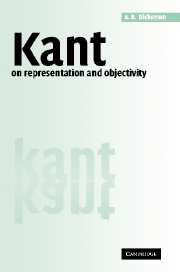2 - Spontaneity and objectivity
Published online by Cambridge University Press: 22 September 2009
Summary
The previous chapter introduced my reading of Kant's notion of representation. The rest of this book gives my reading of the central argument of Kant's Transcendental Deduction in B. In the two chapters following this one (i.e., chapters 3 and 4) my interpretation of this argument will be filled out and defended via a close reading of the main sections of the B-Deduction. The relation of my interpretation to the secondary literature will also be considered in those chapters. In the present chapter, however, I simply attempt to sketch out and explain the main lines of my interpretation, in order to provide the reader with a synoptic view of my reading of this complex argument, before I make the descent into close textual analysis.
In brief, my reading of Kant's argument in the B-Deduction can be summarised as follows. My fundamental claim is that the B-Deduction is primarily an analysis of the concept of cognition. I should note that it would be more precise to say that the B-Deduction is an analysis of the concept of human cognition, considered as a species of discursive cognition in general, which Kant distinguishes from another logically possible form of cognition, the intuitive. However, this is a subtlety which I will defer discussing until a later chapter; in this chapter, I will simply use the terms ‘cognition’ and ‘cognising mind’ as a convenient shorthand for ‘discursive cognition’ and ‘discursive cognising mind’.
Information
- Type
- Chapter
- Information
- Kant on Representation and Objectivity , pp. 32 - 79Publisher: Cambridge University PressPrint publication year: 2003
